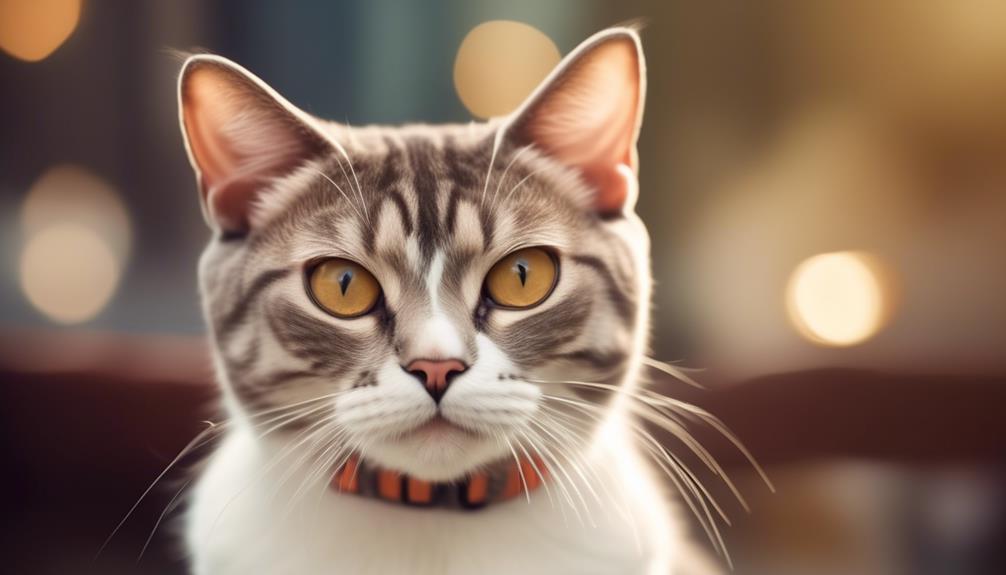
The European Shorthair cat breed is a fascinating and captivating feline that has captured the hearts of cat enthusiasts worldwide.
With its rich history and diverse characteristics, this breed offers a multitude of intriguing traits to explore.
From its physical attributes to its unique personality, there is much to discover about the European Shorthair.
So, let us embark on a journey to uncover the secrets and wonders of this remarkable breed as we delve into the depths of its characteristics and unravel the enigma that is the European Shorthair.
Key Takeaways
- European Shorthairs are medium to large-sized cats with a well-muscled body and a short, dense coat in various colours and patterns.
- They have a friendly and balanced temperament, forming strong bonds with their human companions and getting along well with children and other pets.
- European Shorthairs are adaptable to different living situations and well-suited for travel and adjusting to new environments.
- Regular exercise, mental stimulation, and comprehensive care are essential for their health and well-being. It is important to be aware of potential health issues such as hypertrophic cardiomyopathy, polycystic kidney disease, obesity, and dental problems.
European Shorthair Characteristics
The European Shorthair is a versatile and adaptable cat breed characterized by its medium to large size and well-muscled body.
This natural breed has evolved in Europe, resulting in a robust and resilient feline.
The European Shorthair boasts a short, dense coat in various colours and patterns.
In terms of personality, these cats are known for their friendly and balanced nature.
They get along well with children and other pets and enjoy social interactions, forming strong bonds with their human companions.
Their easygoing and adaptable nature allows them to thrive in various living situations.
Interactive toys, puzzle feeders, climbing structures, and interactive play sessions are recommended to provide adequate exercise for indoor European Shorthairs.
When finding a veterinarian, it is important to research local options, consider their experience with cat breeds, and prioritize comprehensive care and services.
See another cat breed profile.
Exotic Cat Breed
European Shorthair Personality
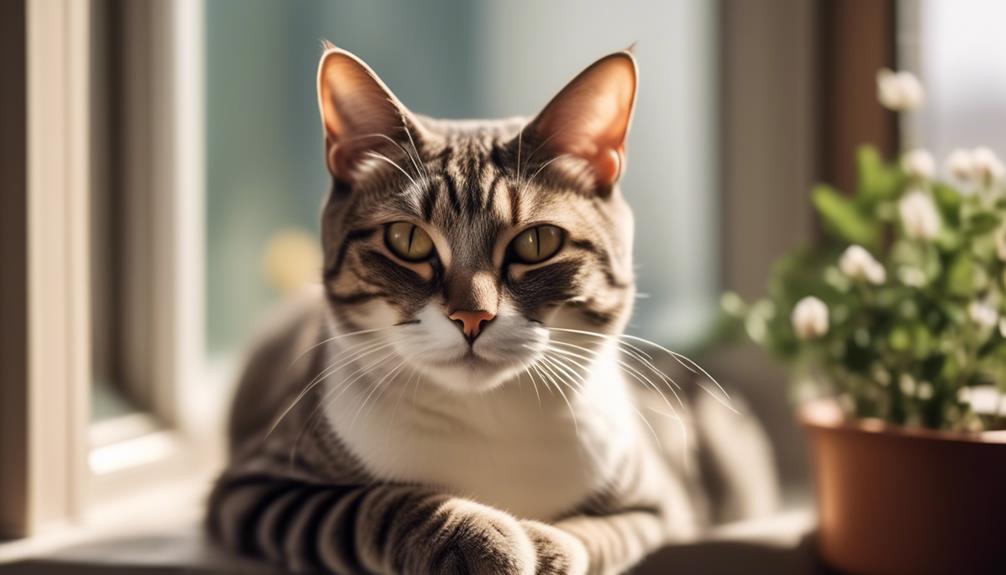
Continuing our exploration of the European Shorthair breed, we now focus on their delightful and well-balanced personalities.
European Shorthairs are known for their friendly and balanced temperaments, making them wonderful companions for families with children and other pets.
They enjoy social interactions and are quick to form strong bonds with their human family members.
Their easygoing and adaptable nature makes European Shorthairs thrive in various living situations, whether in a busy household or a quiet apartment.
Their adaptability also makes them well-suited for travel and adjusting to new environments.
Adopting or Purchasing a European Shorthair
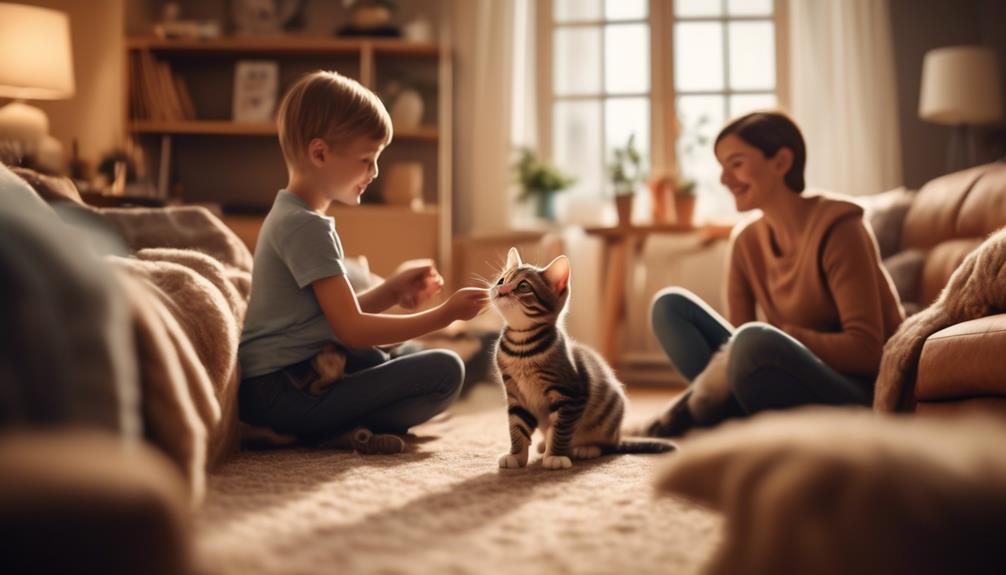
When considering adding a European Shorthair to your family, it is important to consider whether to adopt from a rescue organization or purchase from a reputable breeder.
Both options have advantages, ultimately depending on your preferences and circumstances.
Here are a few factors to consider:
Adoption from a rescue organization:
- Gives a loving home to a cat in need.
- It costs less than purchasing from a breeder.
- Supports the efforts of rescue organizations.
- It provides an opportunity to save a life.
Purchasing from a reputable breeder:
- Allows for more predictability in terms of breed characteristics.
- Provides access to purebred European Shorthair cats.
- Offers the chance to establish a relationship with a breeder for support and guidance.
- Ensures that the cat comes from a responsible breeding program.
Whichever option you choose, it is important to research and make an informed decision that aligns with your values and preferences.
Exercise for Indoor European Shorthairs
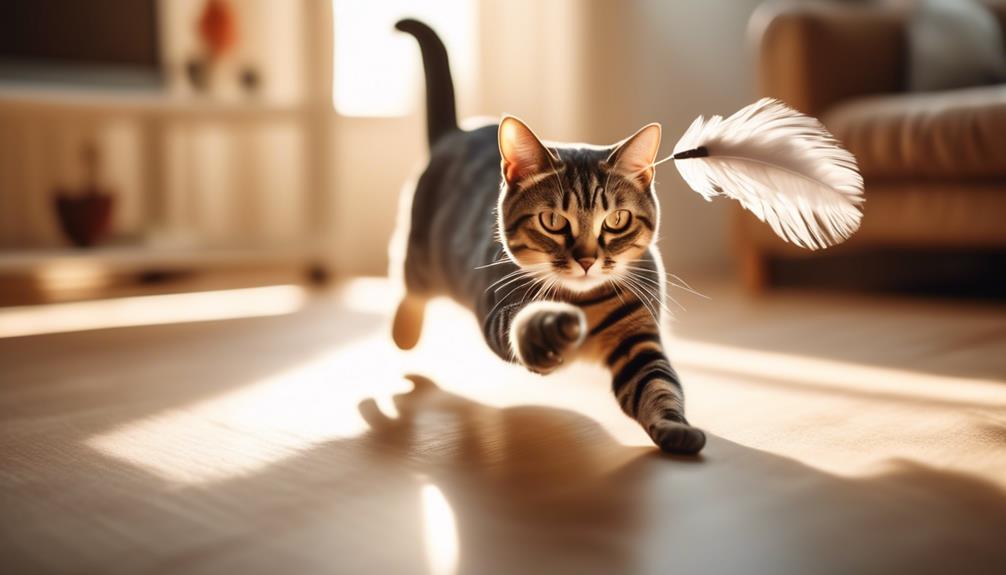
To ensure the well-being of indoor European Shorthairs, providing regular exercise is essential.
Although they adapt well to living in smaller spaces, these cats still require physical and mental stimulation to maintain their health.
Interactive toys and playtime are great ways to engage them in physical activity.
Puzzle feeders can also stimulate their minds while satisfying their feeding needs.
Setting up climbing structures or scratching posts allows them to exercise their muscles and satisfy their climbing instinct.
Engaging in interactive play sessions with their owners is another effective way to keep them active.
Creating a stimulating environment with hiding spots and vertical spaces encourages them to explore and play.
Finding a Veterinarian for Your European Shorthair
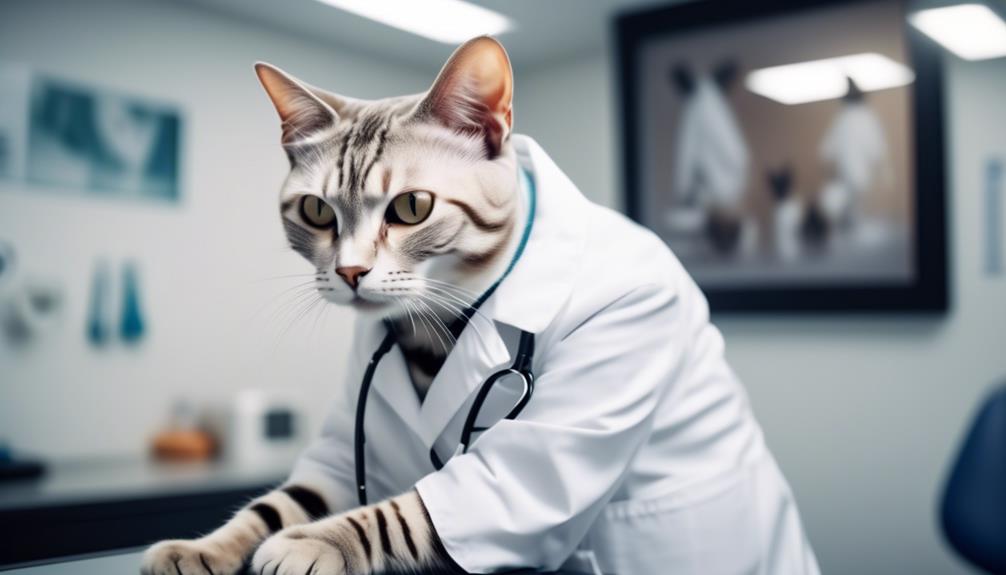
Finding a veterinarian experienced in cat breeds is crucial when seeking the best care for your European Shorthair.
Here are four important factors to consider when finding a veterinarian for your beloved feline companion:
- Expertise in cat breeds: Look for a veterinarian with experience and knowledge specifically in cat breeds, as they will be familiar with European Shorthairs’ unique characteristics and health concerns.
- Comprehensive care and services: Ensure that the veterinarian provides a wide range of services, including preventive care, vaccinations, dental care, and emergency services, to ensure your European Shorthair receives comprehensive care throughout your life.
- Compatibility and communication: Schedule a consultation with potential veterinarians to assess their compatibility with you and your cat. It is important to have open and effective communication with your veterinarian to ensure the best care for your European Shorthair.
- Priority on well-being: Choose a veterinarian who prioritizes your cat’s well-being and takes a proactive approach to their health. They should provide personalized care and be available to address any concerns or questions you may have.
Grooming and Care for European Shorthairs
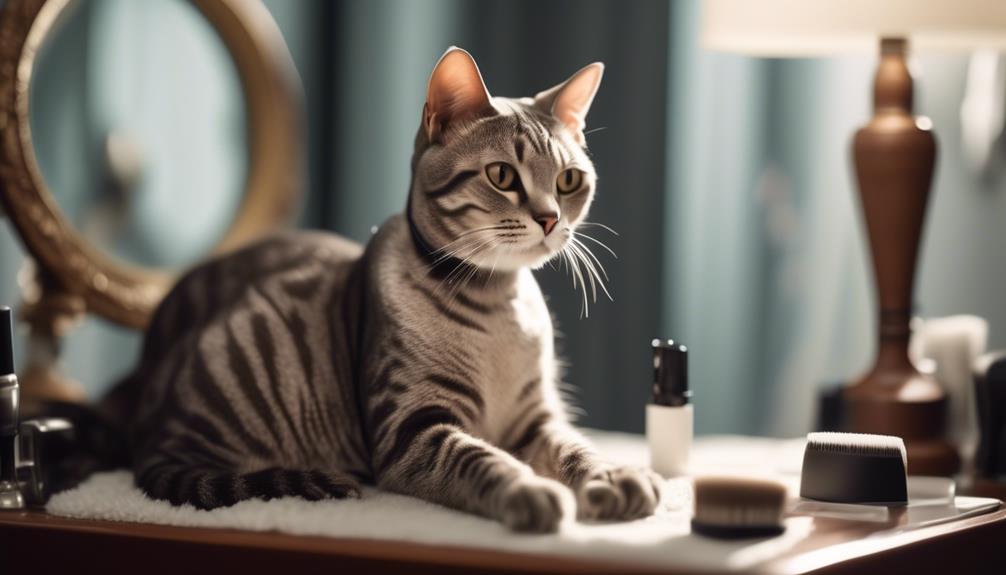
Grooming and caring for European Shorthairs is essential for maintaining their health and well-being.
Despite their short coat, these cats require regular grooming to keep them clean and free from mats or tangles.
Weekly brushing is usually sufficient, using a soft-bristle brush or grooming glove to remove loose hair and distribute natural oils.
Additionally, it is important to check their ears regularly for any signs of infection or debris and clean them as needed.
Dental care is also crucial, as these cats are prone to dental issues. Regular teeth brushing and dental check-ups are recommended.
Lastly, a balanced diet, regular exercise, and a safe, stimulating environment are vital for their care and happiness.
Common Health Issues in European Shorthairs

European Shorthairs are generally known for their robust health and resilience, but like any cat breed, they can still be prone to certain common health issues.
Owners need to be aware of these potential issues and take appropriate measures to ensure the well-being of their European Shorthair.
Here are some common health issues that can affect this breed:
- Hypertrophic Cardiomyopathy (HCM): A genetic heart condition that can lead to heart failure.
- Polycystic Kidney Disease (PKD): A hereditary condition that causes the formation of cysts in the kidneys, leading to kidney failure.
- Obesity: European Shorthairs can be prone to weight gain without a balanced diet and regular exercise.
- Dental problems: Like many cat breeds, European Shorthairs can develop dental issues such as periodontal disease and tooth decay if oral hygiene is not maintained.
Frequently Asked Questions
How Much Do European Shorthair Cats Typically Weigh?
European Shorthair cats typically weigh between 8 to 15 pounds.
However, it’s important to note that individual weight can vary depending on genetics, diet, and exercise.
Regular veterinary check-ups can help monitor and maintain a healthy weight for your European Shorthair cat.
Do European Shorthair Cats Require Any Special Dietary Needs?
European Shorthair cats do not have any special dietary needs.
They can thrive on a balanced and high-quality cat food diet.
It is important to provide them with proper nutrition, including essential nutrients, to maintain their overall health and well-being.
Are European Shorthair Cats Prone to Any Specific Behavioral Issues?
European Shorthair cats are generally not prone to any specific behavioural issues.
However, like all cats, they may exhibit normal cat behaviours such as scratching furniture or marking territory.
Providing proper mental and physical stimulation can help prevent any potential behavioural issues.
How Long Do European Shorthair Cats Typically Live?
The average lifespan of European Shorthair cats is typically between 12 to 16 years.
However, individual factors such as genetics, diet, exercise, and overall health care can influence their longevity.
Regular veterinary check-ups and a healthy lifestyle can contribute to their well-being.
Are European Shorthair Cats Hypoallergenic?
European Shorthair cats are not hypoallergenic.
While they have a short, dense coat, they still produce allergenic proteins found in cat saliva, urine, and dander, which can trigger allergies in sensitive individuals.
Conclusion
In conclusion, the European Shorthair cat breed is a versatile and adaptable feline with a friendly and balanced personality.
They make suitable companions for children and other pets, and their easygoing nature allows them to thrive in various living situations.
Prioritizing rescue organizations or reputable breeders who prioritize health and temperament is recommended when considering adoption or purchase.
Providing exercise, finding a specialized veterinarian, and ensuring proper grooming and care are essential for the well-being of these cats.




